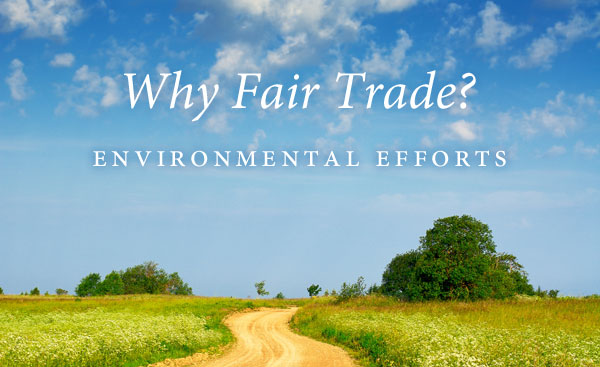
In our series Why Fair Trade?, we aim to illustrate the main reasons why supporting fair trade is important to us. Today Laura explains the environmental benefits of choosing fair trade.
I see so much beauty on this earth, and I want it to flourish. People are beautiful, too, so I want us to experience this beauty for generations to come. Fair trade calls for environmental efforts that will improve the lives of workers in both the short- and long-term, and that has an equal standing with other ethical principles that benefit workers.
In my young adult years, I went on an organic food kick that, to this day, I still practice as often as possible. I also do the usual eco-friendly things like recycling and purchasing post-consumer paper goods, used books, and reusable/biodegradable items. So when I first started looking into fair trade, I was gratified to find out that most companies and labeling organizations include environmental stewardship criteria for businesses. Far beyond the simple measures we can all try at home, some examples of environmental practices that fair trade companies may follow are:
- No GMO’s (Genetically Modified Organisms)
- Specific toxic chemicals not used
- Waste management through reuse and recycling
- Water and energy conservation
- Reduced greenhouse gases
- Organic or reduced pesticide use
My aunt, who owns a small eco press in British Columbia, shared with me her thoughts on sustainability and fair trade. She wrote to me in an email, “The best a company can do, in my opinion, is constantly question both the environmental and economic impact that they are making by offering their product to consumers. Not only question but constantly make strides to improve their footprint.” Fair trade companies, along with my aunt’s press, aim to do their best to keep the impact on the environment low in whatever means possible.
One of my favorite tea companies—for both quality of tea and quality of ethical standards—Choice Organic Teas, explains in their “Why Organic?” section that they seek organic sourcing for benefits like improved soil fertility, better for wildlife, and safer for humans. They say, “How could we be anything other than organic?” because the alternative has negative effects on nature and people.
The Fair Trade Federation’s principle states, “Fair Trade seeks to offer current generations the ability to meet their needs without compromising the ability of future generations to meet their own needs.” Well said.
We care about the health of the people who work to grow and make our products. As much as we hope they have access to medical treatment and good safety measures on the job, we also don’t want them to be exposed to toxins either directly or indirectly. We don’t want them to be harmed by chemicals, or have their clean water wasted or polluted, or lose farmland that can no longer be cultivated. Practicing environmental stewardship is a critical issue, one that these small businesses are admirably attempting to put into place and improve upon over time.
